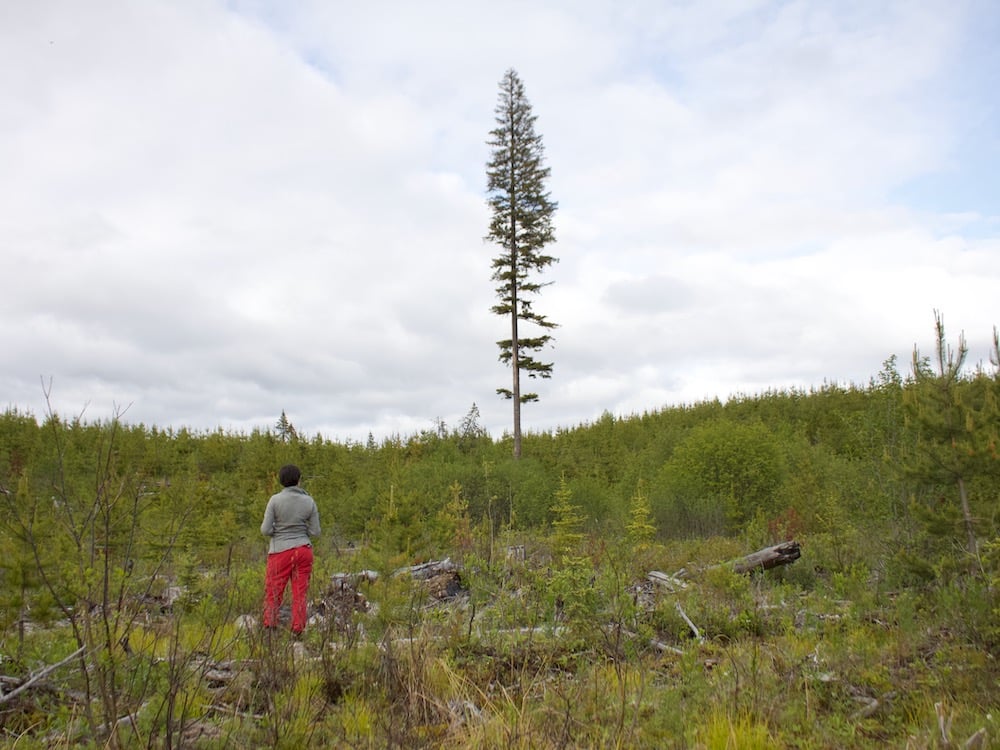Welcome to DU!
The truly grassroots left-of-center political community where regular people, not algorithms, drive the discussions and set the standards.
Join the community:
Create a free account
Support DU (and get rid of ads!):
Become a Star Member
Latest Breaking News
Editorials & Other Articles
General Discussion
The DU Lounge
All Forums
Issue Forums
Culture Forums
Alliance Forums
Region Forums
Support Forums
Help & Search
Environment & Energy
Related: About this forumAfter Decades Of Do Whatever You Want, VP Of Leading BC Logging Company Admits That The Game Is Over

BC has logged much of its forests across the province, leaving vast areas of young replanted stands. Now, its major forest companies are moving their investments elsewhere. Photo for The Tyee by Zoë Yunker.
On a mild day last October, lawyers and executives reconvened, after a quick boxed lunch, beneath the ’80s-era light fixtures of the U.S. International Trade Commission’s Washington, D.C., hearing room. They were ready to settle a long-standing beef. For decades, the United States had charged an import fee on what it saw as an endless stream of cheap and plentiful wood from Canada. For just as long, Canada and its provinces complained that fee was unfair.
A senior vice-president with one of B.C.’s biggest logging companies, West Fraser Timber Co., was there to argue that the industry was screwed either way. “There’s a new normal that’s emerged,” said James Gorman, referring to raging wildfire seasons. “For us, it’s quite a terrifying one.” These worsening fires, Gorman explained — in addition to pest infestations and a glut of too-young-to-harvest forests — mean that Canada, and B.C. in particular, is running low on trees to log.
Listening to the afternoon’s testimony, the panel of commissioners seemed confused. Canada and B.C. pride themselves on sustainable forest management, and they’d sent the panel glossy promotional materials saying as much. The sustainability claim revolves around the “allowable annual cut,” a forestry rule that, in theory, keeps logging within nature’s limits. Last year, for example, B.C. allowed companies to log enough to fill 25 million swimming pools with wood. And yet, Gorman’s company was among those fleeing the province “due to the lack of available fibre.”
EDIT
?t=17
Both the Quesnel and the North Island ecosystems have faced natural disasters like fires that mean most of the remaining unlogged forests are still too young to log. That means industry is vying for the last few percentages of unlogged, mature forests. Daust notes that other ecosystem types in those areas had more primary forests remaining. Cam Brown, a forester and resource analyst for the consulting firm Forsite, says that by his estimate, around half or less of the timber harvesting areas across the province, including low- and high-productivity ecosystems, remain unlogged, but that some areas more targeted by logging have less. When it comes to the more widely known category of old growth, Daust’s research with the province’s Old Growth Technical Advisory Panel paints an even more dire picture: many big-treed ecosystems have dropped below 10 per cent of what was there before, and some have less than one per cent.
EDIT
https://thetyee.ca/News/2024/09/11/Are-BC-Forests-Running-Out-Trees/
2 replies
 = new reply since forum marked as read
Highlight:
NoneDon't highlight anything
5 newestHighlight 5 most recent replies
= new reply since forum marked as read
Highlight:
NoneDon't highlight anything
5 newestHighlight 5 most recent replies
After Decades Of Do Whatever You Want, VP Of Leading BC Logging Company Admits That The Game Is Over (Original Post)
hatrack
Sep 2024
OP
Kid Berwyn
(19,381 posts)1. Like in stupidity, humanity's greed may be limitless.
Unfortunately, the forests are not. Nor the waters. Nor the air.
Envirogal
(189 posts)2. Humanity's unrestrained pillaging
Too many people, buying too much crap they don’t need while our natural resources are stretched beyond their limits by the greed of industry and the consumers. Yet the economy depends on it. That is a recipe for collapse.
Just the cardboard boxes alone from online shopping used ONE TIME is a canary in the coal shaft of the strain we are putting on all of our eco systems.